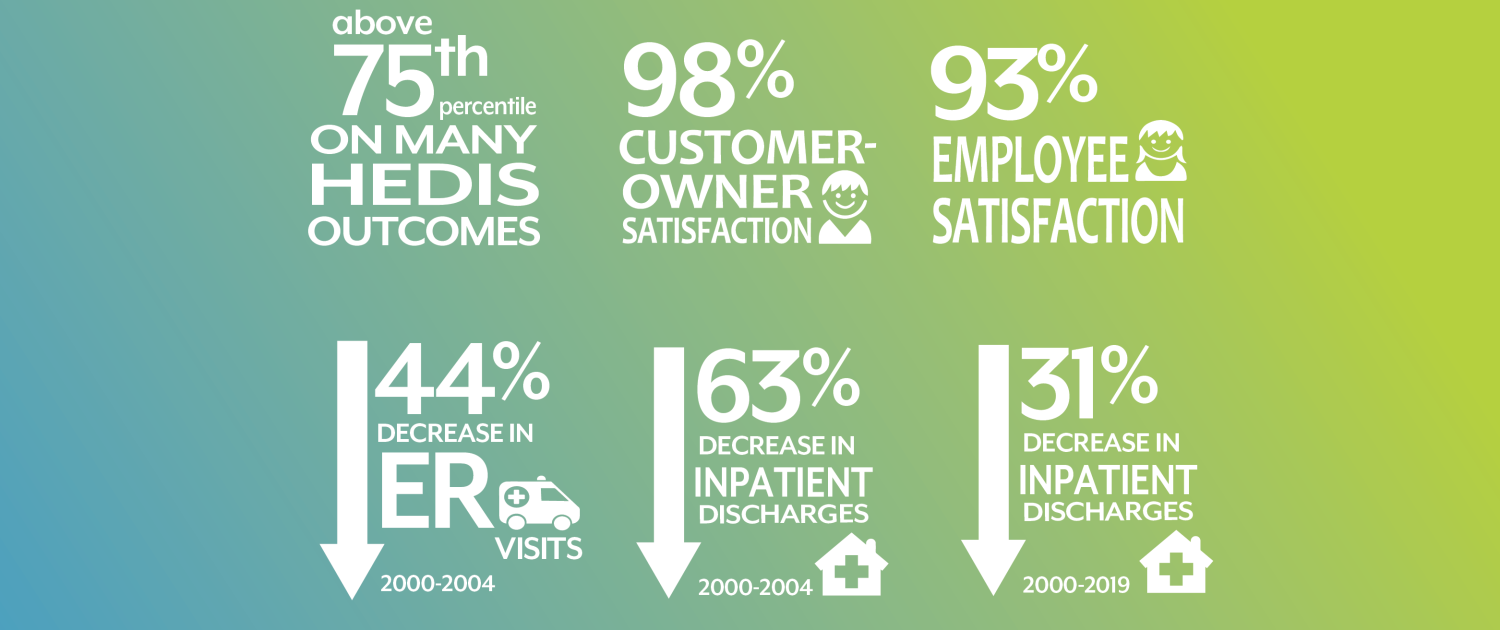A Deep Dive on Nuka System of Care Performance Data
Like most health care systems, Southcentral Foundation regularly collects and analyzes data for regulatory or oversight reporting, for grant management, for billing, and to support quality improvement. Outcome data collected by SCF, both current and historical, supports the effectiveness of SCF’s relationship-based Nuka System of Care. Following is a detailed look at some of the data points that support Nuka’s effectiveness.
- SCF is above the 75th percentile on many HEDIS measures. The Healthcare Effectiveness Data Information Set (HEDIS) is a set of standardized performance measures developed and maintained by the National Committee for Quality Assurance. SCF tracks several of these measures, with a goal of being in the 75th percentile or better. The measures tracked by SCF include adolescent immunizations, diabetes measures, cancer screenings, controlling hypertension, depression screenings, and more. These measures are tied to SCF’s Corporate Initiatives and are an important part about how SCF evaluates quality of care. SCF has achieved benchmarks above the 75th HEDIS percentile for many of these measures, and is above the 90th percentile on several as well.
- 44% decrease in ER visits from 2000 to 2004. This data point is based on both Emergency Room and Fast Track visits per 1000 member months. Fast Track is a department run by SCF next to the Emergency Department to support care continuity and improve access. Customer-owners who are empaneled at SCF who visit the ER are triaged and then Fast Track providers see those who are less sick; for example, someone with a sprained ankle or high fever. We highlight the data from 2000 to 2004 because 2000 is when the impact of SCF’s system transformation was fully felt, and health improvements for customer-owners were seen that year and in the years following. SCF is also below the HEDIS 75th percentile for ER visits (where lower is better).
- 63% decrease in inpatient discharges from 2000 to 2004, and a 31% decrease in inpatient discharges from 2000 to 2019. This data point is based on inpatient discharges per 1000 member months. Discharges are measured, rather than admissions, to keep the format consistent with HEDIS benchmarks. This, along with the data on ER visits, is important to track because while ER visits and hospital stays are sometimes unavoidable, health issues can often be resolved before they progress to the point of requiring an ER visit or a hospital stay.
- SCF has 98% customer-owner satisfaction. This data point is based on post-appointment surveys given to customer-owners to ask them about the quality of their visit. The 98% figure is the percentage of customer-owners who give an affirmative answer to the question “Overall, I am satisfied with my visit at Southcentral Foundation.” SCF also asks other questions on these surveys, including whether the customer-owner’s culture and traditions were respected, if they would recommend their provider to family and friends, and if they were involved in decisions about their care.
- SCF has 93% employee satisfaction. This data point is based on internal surveys done by SCF, specifically the question that asks “Overall, I am a satisfied employee.” Like most health care organizations, we recognize that the COVID-19 pandemic has made comparisons to the time prior to the pandemic difficult, and we are working to navigate that as we continue to collect data.
The data collected by SCF allows evaluation of the effectiveness of the Nuka System of Care and supports improvement projects. For more information about SCF’s data collection, or any of the data points discussed in this blog post, feel free to contact the SCF Learning Institute.




